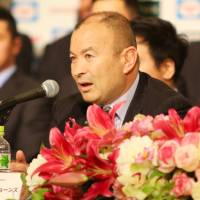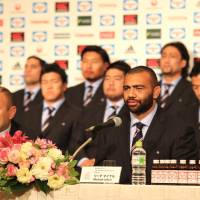Japan's Rugby World Cup heroes returned home on Tuesday with a vow to continue their new "winning culture" when the country hosts the event in four years' time.
Crowds gathered at Haneda airport to welcome Eddie Jones' Brave Blossoms back from England, where they shocked the world by beating two-time champions South Africa in their opening game before losing to Scotland and racking up historic victories over Samoa and the United States.
Japan had won only one Rugby World Cup game going into this year's competition — against Zimbabwe in 1991 — but returned home having earned the bittersweet honor of becoming the first country to win three games and still fail to reach the quarterfinals.
The players immediately turned their attention toward the 2019 event being held on home soil, with captain Michael Leitch insisting that the Brave Blossoms are capable of claiming a place in the last eight.
"We couldn't get to the quarterfinals this time, but to win three games is a big step up for Japanese rugby," Leitch told a packed news conference at a Tokyo hotel.
"As the captain of this team, I'm very proud. The players gave everything in every game. We created a winning culture in the team and we want to continue it. Eddie is a very passionate coach and although he will go abroad now, he has been a huge figure in Japanese rugby. I hope Japanese rugby will get even more attention from now on."
Japan's 34-32 win over South Africa on Sept. 19 — the biggest upset in Rugby World Cup history — catapulted the Brave Blossoms into the spotlight in Japan, where rugby lags far behind baseball and soccer in the public's sporting interest.
A record Rugby World Cup TV audience of 25 million Japanese viewers — around a fifth of the population — watched Japan's 26-5 win over Samoa on Oct. 3, and Jones insists that the sport must build on its new-found popularity.
"They are the heroes," said Australian Jones, who will now leave to take up a coaching position with the Stormers Super Rugby side in South Africa. "They have changed Japanese rugby.
"To finish the tournament ninth in the world ahead of countries like England is an absolutely amazing success story. But like any success story, the next chapter is so important. The next chapter is finding new players with more talent and desire and to make sure this group keeps improving."
Players like Leitch and fullback Ayumu Goromaru have become household names through their World Cup exploits, and Goromaru is hoping to inspire a new generation.
"The little things over the last four years have built up and up to produce this result," said the 29-year-old Goromaru, whose distinctive stance as he prepares to kick penalties has been a big hit with TV viewers.
"I'm glad that kids are looking up to me."
The Brave Blossoms won admirers all over the world with their exciting playing style in England, and also with their courageous decision to go for the victory against South Africa with the last play of the game. Japan decided to pass up an easy penalty, which would have secured a draw, and was rewarded when Karne Hesketh scored the match-winning try.
"The emotion that grew throughout the tournament is like nothing I've ever experienced in my career," said Australian-born Craig Wing. "We even had fans from the other team wanting us to win the game. I'm very proud to have been a part of that."
Jones has faced calls from the public to continue in the job until 2019, but the 55-year-old insists that the team is in safe hands.
"The result of this World Cup is not about me, it's about these players," said Jones, who has also been linked with the England coaching job. "Everyone should be saying they want these players to continue. These are the guys who made the result.
"There will be another coach come and he will probably be better than me. But the way this team develops will be down to the quality of the players. It's always sad when you leave a team you love."



















With your current subscription plan you can comment on stories. However, before writing your first comment, please create a display name in the Profile section of your subscriber account page.